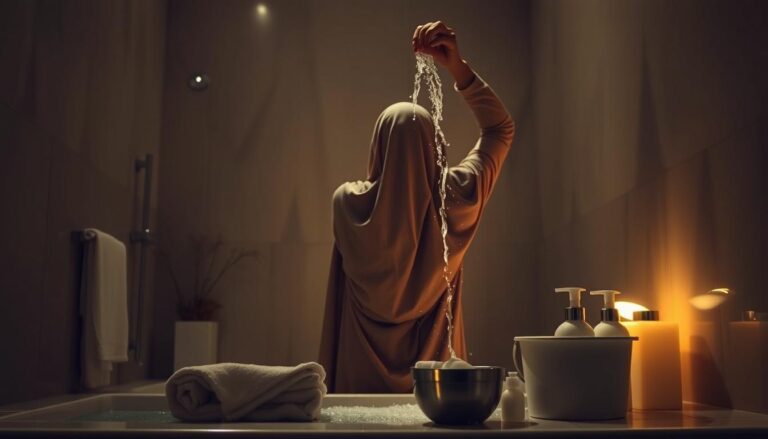How To Do Ghusl(Full Body Wash) In Islam
✨🕌Step-by-Step Tutorial for Islamic Full Body Wash

Welcome to EasyIslamForAll.com, your ultimate guide to understanding and performing Ghusl in Islam. Whether you’re new to Islam or looking to improve, this guide will walk you through everything you need to know about how to do ghusl, its importance, and how to perform it correctly. Let’s dive in!
Table of Contents
What is Ghusl in Islam?
When is Ghusl Required?
How to Do Ghusl After Period
How to Perform Ghusl After Menstruation
How to Do Ghusl After Sex
How to Perform Janaba Ghusl
Step-by-Step Guide: How to Do Ghusl
Preparations Before Ghusl
Fard (Obligatory) Steps of Ghusl
Sunnah (Recommended) Steps of Ghusl
Ghusl for Women: Special Considerations
Common Mistakes to Avoid During Ghusl
Spiritual Benefits of Ghusl
FAQs About Ghusl in Islam
Conclusion: Embracing Purity Through Ghusl
1. What is Ghusl in Islam?
Ghusl is an Islamic ritual of full-body purification. It is required after certain events, such as menstruation, sexual intercourse, postpartum bleeding, or wet dreams. Ghusl is not just about physical cleanliness; it is a spiritual act that prepares Muslims for worship, prayer, and other sacred acts.
“Allah loves those who turn to Him constantly and love cleanliness.” (Quran 2:222)
By performing Ghusl, you fulfill a key Islamic obligation and renew your connection with Allah. It is a powerful way to cleanse both your body and soul.
2. When is Ghusl Required?
Ghusl is mandatory in several situations. Let’s explore each one in detail:
How to Do Ghusl After Period
Women must perform Ghusl after their menstrual cycle ends. This is a crucial step to regain ritual purity (Taharah) and resume prayers and other acts of worship.
Key Tip: Ensure that bleeding has completely stopped for at least 24 hours before performing Ghusl.
How to Perform Ghusl After Menstruation
This is similar to how to do ghusl after period, but it specifically addresses the steps women need to take after menstruation. It’s important to ensure that all traces of blood are gone before performing Ghusl.
How to Do Ghusl After Sex
Both partners must perform Ghusl after sexual intercourse, even if there is no ejaculation. This ensures that they are in a state of purity before praying or touching the Quran.
How to Perform Janaba Ghusl
Janaba refers to the state of major ritual impurity, which occurs after sexual intercourse or ejaculation. Performing Ghusl in this state is essential for regaining purity.
3. Step-by-Step Guide: How to Do Ghusl in Islam
Performing Ghusl correctly is essential for its validity. Follow these steps to ensure you do it right:
Preparations Before Ghusl
Find a private, clean space.
Gather your supplies: clean water, mild soap, towel, and a small basin.
Remove any nail polish or jewelry.
Set the water temperature to a comfortable level.
Fard (Obligatory) Steps of How to make Ghusl
Make the Intention (Niyyah): Silently intend to perform Ghusl for purification.
Wash the Entire Body: Ensure water reaches every part, including the mouth, nostrils, and hidden areas like the navel and between toes.
Sunnah (Recommended) Steps of Ghusl
Start with Wudu: Wash your hands, face, and arms as you would for Wudu.
Pour Water Over the Head Three Times: Ensure water reaches the scalp.
Begin with the Right Side: Wash the right side of the body first, then the left.

4. How To Do Ghusl: Special Considerations Ghusl for Women:
Women have unique needs when performing Ghusl, especially regarding long hair and modesty. Here are some tips:
Managing Long Hair: Undo braids or tight hairstyles to ensure water reaches the scalp.
Modesty: Use towels to cover your shoulders while drying.
Efficiency: Remove makeup and nail polish before starting Ghusl.
5. Common Mistakes to Avoid During Ghusl
Avoid these common errors to ensure your Ghusl is valid:
Skipping Hair Roots: Ensure water reaches the scalp.
Neglecting Hard-to-Reach Areas: Don’t forget elbows, knees, and between fingers/toes.
Rushing the Process: Take your time to ensure thorough cleansing.
6. Spiritual Benefits of Ghusl
Ghusl is more than just a physical wash; it is a spiritual reset. Here’s how it connects the physical and spiritual aspects of purification:
| Physical Aspect | Spiritual Aspect |
|---|---|
| Rinsing the body | Renewing intention (niyyah) to worship |
| Removing dirt and impurities | Seeking closeness to Allah |
7. Conclusion: Embracing Purity Through Ghusl
Ghusl is more than just a ritual; it is a way to connect with Allah and renew your faith. By performing Ghusl correctly, you embrace both physical cleanliness and spiritual purity.
Contact Us for Any Queries
If you have any questions about Ghusl or other Islamic practices, feel free to reach out to us at EasyIslamForAll.com.
Quran & Hadith References
From the Qur’an
- Obligation of Ghusl for Major Impurity (Janabah):
- “And if you are in a state of Janabah (sexual impurity), then purify yourselves.”
(Surah Al-Ma’idah, 5:6) - “O you who have believed, do not approach prayer while you are in a state of Janabah until you have washed your whole body.”
(Surah An-Nisa, 4:43)
- “And if you are in a state of Janabah (sexual impurity), then purify yourselves.”
- Purification for Worship:
- “Indeed, Allah loves those who constantly turn to Him in repentance and loves those who purify themselves.”
(Surah Al-Baqarah, 2:222)
- “Indeed, Allah loves those who constantly turn to Him in repentance and loves those who purify themselves.”
From Hadith
- How the Prophet ﷺ Performed Ghusl:
- Aisha (RA) narrated:
“When Allah’s Messenger ﷺ performed Ghusl after Janabah, he would start by washing his hands, then pour water with his right hand onto his left hand and wash his private parts. Then he would perform Wudu as for prayer, take water, and run his fingers through his hair to ensure water reached the roots. After that, he would pour water over his head three times and then wash the rest of his body.”
(Sahih al-Bukhari, Hadith 248; Sahih Muslim, Hadith 316)
- Aisha (RA) narrated:
- Mandatory Ghusl for Certain Impurities:
- The Prophet ﷺ said: “When a man sits between the four parts of a woman and has intercourse with her, Ghusl becomes obligatory.”
(Sahih al-Bukhari, Hadith 291; Sahih Muslim, Hadith 348)
- The Prophet ﷺ said: “When a man sits between the four parts of a woman and has intercourse with her, Ghusl becomes obligatory.”
- Ghusl After Menstruation:
- Aisha (RA) narrated:
“The Prophet ﷺ told a woman after her menstruation: ‘Take a bath (Ghusl) and clean yourself thoroughly, then pray.'”
(Sahih al-Bukhari, Hadith 314; Sahih Muslim, Hadith 332)
- Aisha (RA) narrated:
- Recommendation for Ghusl on Friday:
- The Prophet ﷺ said: “It is obligatory upon every Muslim to perform Ghusl on Friday, to use a tooth stick (Miswak), and to apply perfume if available.”
(Sahih al-Bukhari, Hadith 880; Sahih Muslim, Hadith 846)
- The Prophet ﷺ said: “It is obligatory upon every Muslim to perform Ghusl on Friday, to use a tooth stick (Miswak), and to apply perfume if available.”
These references highlight the importance of Ghusl in maintaining both physical and spiritual purity in Islam.
FAQ
FAQ
What are the ghusl steps for ladies?
Ladies start by making the intention (niyyah). Then, they wash their hands and clean their private parts. Next, they perform wudu (ablution). Finally, they pour water over their entire body, making sure hair and skin are wet.
What is the difference between ghusl and wudu?
Ghusl is a full-body wash needed in certain situations. Wudu, on the other hand, is a partial wash for hands, face, and feet. It’s done before daily prayers.
When is ghusl required in Islam?
Ghusl is needed after major impurities like sex, menstruation, or childbirth. It’s also a good idea before big religious events like Hajj or Eid prayers.
How to perform ghusl in Islam?
Start with the niyyah (intention). Then, wash your hands and clean your private parts. Do wudu as for prayer. Finally, pour water over your body three times, covering all areas, including hair roots.
What are the ghusl steps for women?
Women follow the same steps as men but with extra care for long hair and modesty. It’s key to clean all body parts and ensure water reaches the scalp.
Why is ghusl important in Islam?
Ghusl is important for both physical and spiritual cleansing. It prepares individuals for prayer and deepens their faith connection.
Is ghusl after menstruation in Islam mandatory?
Yes, ghusl after menstruation is mandatory. It’s needed to regain ritual purity for prayers and worship.
How do you do ghusl properly?
Ensure your body is clean and make the intention. Perform wudu and pour water over your body three times. Make sure to cover all areas well.
What should I do if I have long hair when performing ghusl?
If you have long hair, undo braids or styles. This lets water reach your scalp and roots. You can brush or separate your hair while rinsing to ensure coverage.
Can I perform ghusl in a shower?
Yes, you can do ghusl in a shower. Just make sure to follow the steps to wash your entire body, including your hair.
What are common mistakes to avoid during ghusl?
Avoid rushing, missing areas, and not getting water to your hair roots. Also, don’t forget to clean your mouth and nostrils. Take your time for thoroughness.
Are there cultural variations in ghusl practices?
Yes, while ghusl basics are the same, cultures may differ. This includes using specific soaps or oils or showing modesty in certain ways.
How can I teach children about ghusl?
Explain the importance of cleanliness and its religious value. Use simple language and fun visuals. Model proper ghusl practices while respecting their modesty.
What are the steps of Ghusl for women?
Women follow the same steps as men but with extra care for long hair and modesty.
Is Ghusl after menstruation mandatory?
Yes, Ghusl after menstruation is mandatory to regain ritual purity.
Can I perform Ghusl in a shower?
Yes, you can perform Ghusl in a shower as long as you follow the proper steps.
“For any question or Masala related to “How to do ghusl”, “how to do ghusl after period”, or “ghusl for women” or any other topic related to Islam or Islamic ruling you can contact us
Also check out our You tube Chancel at EasyIslamForAll
“

